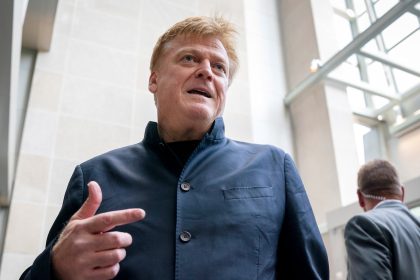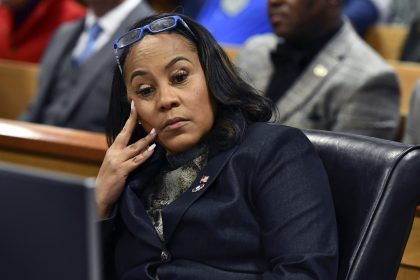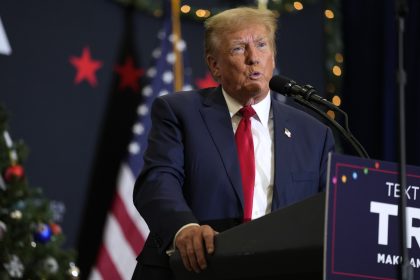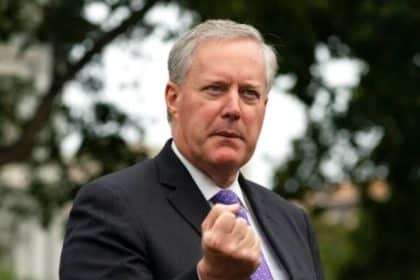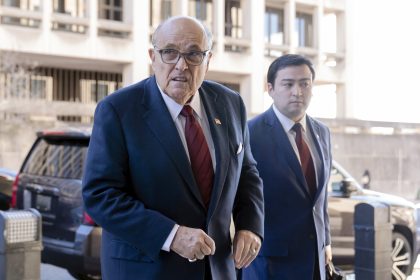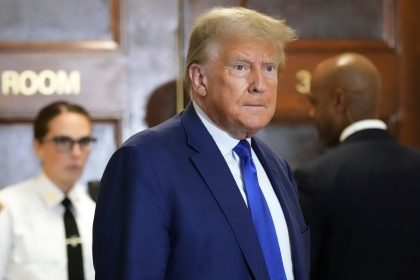Trump May Withhold Tax Returns and Appear on Ballot, California Supreme Court Rules

SAN FRANCISCO — For years, Democrats have tried to force President Donald Trump to disclose his tax returns, and Trump has resisted. The California Legislature, aiming at the president, passed a law this year to try to force Trump’s hand.
On a party-line vote, lawmakers approved a bill to require presidential candidates to disclose five years of tax returns in order to appear on the state’s primary ballot, the first such law in the nation.
It did not survive even six months.
California’s highest court decided Thursday that the Legislature went too far. Though legislators and analysts considered early on whether the requirement might conflict with federal law, the California Supreme Court determined it was the state’s own Constitution that barred such a condition.
Chief Justice Tani G. Cantil-Sakauye, writing for the court, said the Legislature lacked the authority to create the “unenforceable” requirement. The decision by the seven-member court — which now has a majority of Democrat-appointed justices — was unanimous.
The case was the latest clash between Trump and California. The state has gone to court to challenge the president repeatedly on abortion rights, immigration and other matters, and Trump, in turn, has sued the state and tried to prevent it from enacting laws that counter his policies.
His victory Thursday, in a challenge brought by the state Republican Party and its chairwoman, was decisive. California’s top court has the final say on matters of state law.
“The Legislature may well be correct that a presidential candidate’s income tax returns could provide California voters with important information,” Cantil-Sakauye wrote.
But because the state Constitution requires inclusive, open presidential primary elections, Trump may withhold his returns and voters will have to decide whether the lack of disclosure has “consequences at the ballot box,” she wrote.
During a hearing this month, Cantil-Sakauye noted that legislators and analysts working on the bill apparently failed to even consider the section of the state Constitution that makes the primary ballot accessible to all “recognized” presidential candidates.
Republican leaders were jubilant. They denounced Democrats for failing to address “real issues” such as power shutdowns, homelessness and the lack of affordable housing and for instead pursuing “bad legislation.”
The requirement overturned Thursday “interferes with our elections, is unconstitutional, a waste of taxpayer money, and a direct attack on democracy,” said state Senate Minority Leader Shannon Grove, R-Bakersfield.
Democrats remained defiant. Jesse Melgar, a spokesman for Gov. Gavin Newsom, who signed the bill into law, said California would “continue to fight against the self-dealing, conflicts of interest and blatant corruption that have pervaded the Trump presidency.”
Even though California’s effort to force Trump’s disclosure has failed, “Congress and other states can and should take action to require presidential candidates to disclose their tax returns,” Melgar said.
The law would have required all presidential primary candidates to submit their income tax filings by Tuesday to secure a spot on California’s March 3 presidential primary ballot. State election officials were required to post the financial documents online, with certain private information redacted.
A portion of the new law that requires candidates for governor to release their tax returns before the statewide primary, beginning in 2022, was not challenged and remains in effect.
In overturning the provisions affecting presidential primaries, the court cited Proposition 4, a constitutional amendment approved by voters in 1972 that made it easier for presidential candidates to get on the state ballot. The court said that amendment barred the new disclosure requirement in the law, called the Presidential Tax Transparency and Accountability Act.
“Whatever authority the Legislature may have in defining how presidential primaries are to occur in this state, the challenged sections of the act exceed such authority and are unenforceable,” Cantil-Sakauye wrote for the court.
Supporters of the requirement said it would ensure voters were fully informed before casting their ballots. Newsom, when signing the bill into law, said the tax disclosures would “shed light on conflicts of interest, self-dealing, or influence from domestic and foreign business interest.”
Attorneys for Jessica Millan Patterson, the chairwoman of the California Republican Party, argued that the provision would suppress GOP turnout in March if Trump’s name did not appear and might affect a handful of competitive state legislative races.
That the requirement might not ultimately pass legal muster was well known during legislative deliberations over the law, Senate Bill 27.
Many of the proposal’s critics read aloud from a 2017 veto message written by then-Gov. Jerry Brown in his rejection of essentially the same bill — a veto in which Brown sounded a note of constitutional skepticism and alarm that demands for more personal candidate information could be acceptable if a new precedent was established.
And yet Democratic lawmakers pressed on, convinced of the urgency of the issue as the 2020 election appeared on the political horizon.
Two people involved in the legislative process this year, both of whom asked not to be identified in order to discuss private state Capitol conversations, said Democrats believed all along that there would be clear political benefits to passing SB 27 even if it ultimately failed in the courts. Even those who were skeptical of the policy change, the sources said, saw little downside in voting in favor of the bill.
There is at least some evidence that their political calculation was right. A poll conducted for the Los Angeles Times by the University of California, Berkeley Institute of Governmental Studies in September found that 67% of likely voters supported the tax return disclosure law. While Republicans were opposed, Democrats and unaffiliated voters were in favor of the effort.
Though Democrats knew the California law stood little chance with the U.S. Supreme Court, they seemed blindsided by its being challenged as a violation of the California Constitution. Few found any wiggle room in Thursday’s decision to try to revive the issue when the Legislature reconvenes in January.
In a concurring opinion to the decision, Justice Mariano-Florentino Cuéllar stressed that it was “narrow.”
It does not “prohibit the Legislature from encouraging or seeking such information from a presidential candidate” as long as the disclosure is not a condition of appearing on the ballot, he wrote.
Indeed, he added, presidential candidates, with only a few exceptions, have disclosed their tax records for decades.
“The general availability of this information reflects an ongoing public and historical interest in the financial honesty and competence of those seeking the highest office in the land,” Cuéllar said.
Even if the state high court had upheld the disclosure provision, it could not have been enforced this year under an order by Sacramento-based U.S. District Judge Morrison C. England Jr.
England ruled in September that the presidential disclosure requirement violated four different sections of the U.S. Constitution in addition to a separate federal law. The state appealed his ruling to the 9th U.S. Circuit Court of Appeals but did not ask for expedited review to obtain a decision in time for the March primary.
“Maybe they saw the writing on the wall,” said Thomas W. Hiltachk, who represented the California Republican Party before the state Supreme Court.
Given Thursday’s decision, the state will now withdraw its appeal of the federal injunction, said Secretary of State Alex Padilla.
“While we are disappointed in today’s ruling, the movement for greater transparency will endure,” Padilla said. “The history of our democracy is on the side of more transparency, not less.”
———
Dolan reported from San Francisco and Myers from Sacramento.
———
©2019 Los Angeles Times
Visit the Los Angeles Times at www.latimes.com
Distributed by Tribune Content Agency, LLC.

















